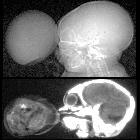Teratom des Pharynx



Epignathus is a term given to a very rare form of teratoid tumor that arises from the oropharyngeal region.
Epidemiology
There may be a slight female predilection . The estimated incidence is ~ 1 in 35,000 to 200,000 births.
Clinical presentation
The tumor classically presents in utero or in the neonatal period. In extreme rare occasions, it may present in young children .
Pathology
It is often classified under the broader umbrella of cervical teratomas. The tumors are not often consistent in origin, number, and differentiation of tissues. They usually have components from all three germ layers and can contain fat, cartilage and bone.
Location
The tumor typically arises from the palato-pharyngeal region around the basisphenoid (Rathke's pouch) and with progressive growth fills the buccal cavity and finally protrudes out of the mouth.
Associations
- polyhydramnios: when there is associated swallowing impairment
- mid line facial dafects
Markers
- raised maternal serum alpha feto protein (MSAFP)
Radiographic features
Antenatal ultrasound
Usually seen as a complex mass protruding from the fetal oral cavity (often with mixed echogenecity ). Accompanying polyhydramnios may be present when there is swallowing impairment.
MRI
Useful for better delineation of anatomy.
Treatment and prognosis
The prognosis is generally poor (often as a result of its location) and part of the high mortality rate is caused by severe airway obstruction in the neonatal period. The tumor may also demonstrate rapid growth. An EXIT procedure can be offered in selected cases .
Complications
- development of fetal hydrops: often due to tumor shunting/using a lot of blood flow
- the tumor can spread superiorly destroying the skull base and brain tissue
- this in turn can give a range complications such as fetal hydrocephalus
- neonatal death usually occurs due from airway obstruction and consequent asphyxia after birth
Differential diagnosis
In general consider other tumors from the oropharyngeal region:
- oropharyngeal rhabdomyosarcoma
- epulis/congenital oral granular cell myoblastoma
For small lesions on a sagittal ultrasound scan also consider:
- macroglossia
- prominent philtrum/premaxillary tissue from a midline facial defect (can also be an association)
See also
Siehe auch:
- Teratom
- Rhabdomyosarkom
- epulis
- Tumoren des Nasopharynx
- Makroglossie
- kongenitales zervikales Teratom
- Teratom der Nase
- kongenitales Teratom des Pharynx
und weiter:

 Assoziationen und Differentialdiagnosen zu Teratom des Pharynx:
Assoziationen und Differentialdiagnosen zu Teratom des Pharynx:



